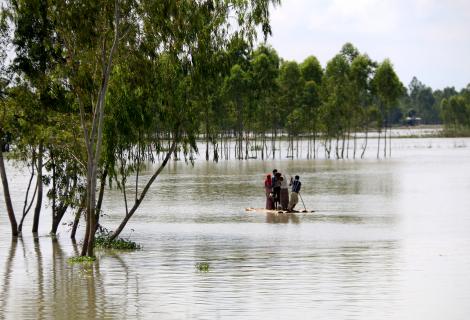
Fair taxes can raise over US$2 trillion yearly for climate-vulnerable communities, says new ActionAid report amid Bonn finance talks
Implementing fair taxes can help the world raise more than US$2 trillion yearly to help frontline communities cope with climate chaos and transition to greener pathways, shows a new ActionAid report.
The report comes as climate negotiators meet in Bonn to get the ball rolling on plans to set a new climate finance goal to be agreed at COP29.
As communities grapple with heatwaves and repeated floods, ActionAid’s report, titled Finding the Finance: Tax Justice and the Climate Crisis, reveals that tax justice will be central to finding the funds urgently needed for climate action.
ActionAid’s data finds that increasing tax-to-GDP ratios by four percentage points in developed countries can raise over US$2 trillion per year towards the international climate finance goal.
ActionAid International’s Global lead on Climate Justice, Teresa Anderson, says:
“There’s no way around the fact that if we want enough climate action to ensure a safe future, we’re going to have to find a way of covering the costs. But UN climate talks are being poisoned by the false narrative that there’s not enough money, and that developing countries should accept a weak climate finance goal based on loans that will push them deeper into debt.
“The good news is that with fair and ambitious taxes that target the biggest polluters, it’s entirely possible for wealthy countries to raise the trillions that can give our planet and its people a fighting chance to address the climate crisis. When it comes to climate action, tax justice can be a game changer.”
In addition, the groundbreaking UN General Assembly decision last year to set up a new UN Framework Convention on Tax may be transformative in enabling climate-vulnerable “developing” countries to raise increased domestic revenue for their national climate action.
David Archer, the Head of Programmes and Influencing at ActionAid International, says:
“Tax justice will be central to raising the trillions of dollars needed every year in climate finance. We need progressive, gender-responsive and climate sensitive action on tax in rich, high-polluting countries. We also need to see changes in how global tax rules are set and enforced, so climate vulnerable countries can increase their own domestic tax revenues. There are huge new opportunities for greater global coordination on tax which can be accelerated through urgent work on developing the UN Framework Convention on Tax.”
The report bemoans the low tax revenues in developing countries which partly result from coercive economic advice from the International Monetary Fund (IMF) and the unfair global tax rules created over the past 60 years by the club of wealthy countries.
To help “developing” countries end austerity and invest in vital domestic priorities such as climate action and gender responsive public services, the research shows that the 64 most climate vulnerable countries could raise over US$ 300 billion per year, through increasing their own tax-to-GDP ratios by five percentage points (as a key IMF report suggests is necessary and feasible), achieving this through fair tax systems that target the wealthiest individuals and companies.
Chikumbutso Ngosi, ActionAid’s International Project Manager for Young Urban Women project based in Malawi, says:
“Countries like Malawi face a double tragedy - debt distress and heightened vulnerability to climate change. Over the years, we have endured cyclones, floods and droughts. Unfortunately, the world’s major polluters have failed to contribute to the Loss and Damage Fund, while unyielding colonial financial systems have crippled our ability to tackle the climate and debt crises. It's time to act. The funds we desperately need to combat the effects of climate change are locked in untapped taxes. Adopting progressive taxation, that doesn't burden poor countries and communities, can unlock these trillions.”
The report calls on the IMF and national Finance Ministries to adopt tax policies that are ambitious, fair, gender responsive and climate sensitive.
Please contact the ActionAid press office on media-enquiries@actionaid.org or on +263776665065 (calls and WhatsApp) to arrange.